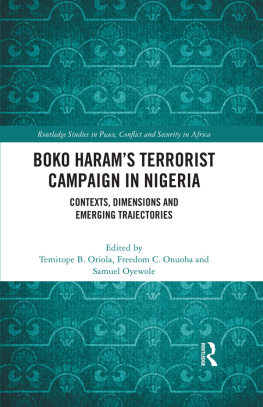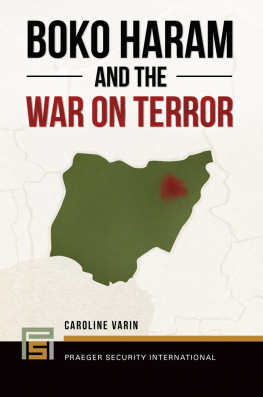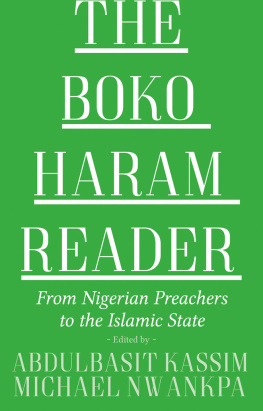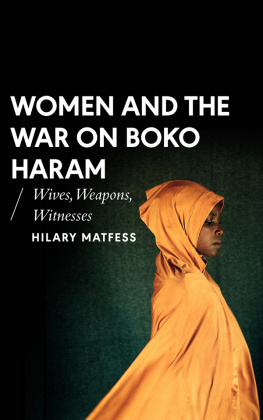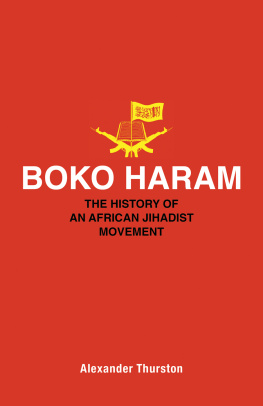Boko Haram. - Boko Haram: Nigerias Islamist Insurgency
Here you can read online Boko Haram. - Boko Haram: Nigerias Islamist Insurgency full text of the book (entire story) in english for free. Download pdf and epub, get meaning, cover and reviews about this ebook. City: Nigeria, year: 2015;2016, publisher: Hurst & Company, genre: Politics. Description of the work, (preface) as well as reviews are available. Best literature library LitArk.com created for fans of good reading and offers a wide selection of genres:
Romance novel
Science fiction
Adventure
Detective
Science
History
Home and family
Prose
Art
Politics
Computer
Non-fiction
Religion
Business
Children
Humor
Choose a favorite category and find really read worthwhile books. Enjoy immersion in the world of imagination, feel the emotions of the characters or learn something new for yourself, make an fascinating discovery.

- Book:Boko Haram: Nigerias Islamist Insurgency
- Author:
- Publisher:Hurst & Company
- Genre:
- Year:2015;2016
- City:Nigeria
- Rating:4 / 5
- Favourites:Add to favourites
- Your mark:
- 80
- 1
- 2
- 3
- 4
- 5
Boko Haram: Nigerias Islamist Insurgency: summary, description and annotation
We offer to read an annotation, description, summary or preface (depends on what the author of the book "Boko Haram: Nigerias Islamist Insurgency" wrote himself). If you haven't found the necessary information about the book — write in the comments, we will try to find it.
Boko Haram.: author's other books
Who wrote Boko Haram: Nigerias Islamist Insurgency? Find out the surname, the name of the author of the book and a list of all author's works by series.
Boko Haram: Nigerias Islamist Insurgency — read online for free the complete book (whole text) full work
Below is the text of the book, divided by pages. System saving the place of the last page read, allows you to conveniently read the book "Boko Haram: Nigerias Islamist Insurgency" online for free, without having to search again every time where you left off. Put a bookmark, and you can go to the page where you finished reading at any time.
Font size:
Interval:
Bookmark:

First published in the United Kingdom in 2015 by
C. Hurst & Co. (Publishers) Ltd.,
41 Great Russell Street, London, WC1B 3PL
Virginia Comolli, 2015
All rights reserved.
Printed in England
Distributed in the United States, Canada and Latin America by Oxford University Press, 198 Madison Avenue, New York, NY 10016, United States of America
The right of Virginia Comolli to be identified as the author of this publication is asserted by her in accordance with the Copyright, Designs and Patents Act, 1988.
A Cataloguing-in-Publication data record for this book is available from the British Library.
ISBN: 978-184904-491-2
eISBN: 978-184904-608-4
www.hurstpublishers.com
This book is printed using paper from registered sustainable and managed sources.
There are a number of individuals and organisations I owe a big thank you to. Many, unfortunately, I will not be able to acknowledge in writing to respect their wish to remain anonymous. First is my friend and colleague Raffaello Pantucci who gave me the impetus to write this book in the first place. I am grateful to Akali Omeni for his expert advice. I would like to thank Lucy Freedman and James Verini for sharing their contacts and those listed below for agreeing to being interviewed and generously sharing their knowledge with me: Admiral O. S. Ibrahim, Major General Chris Olukolade, Minister Abba Moro, Major General Sarkin Yaki Bello, Dr Fatima Akilu, Dr Ustaz Aminu Igwegbe, Reverend Musa Asake, Bishop Ronsome Bello, Professor Tijjani Bande, Hussaini Abdu, Muhammad Zubair, Dr Freedom Onoua, the staff at the Ministry of Foreign Affairs in Abuja, Borno state officials, the staff of the Nigeria Stability and Reconciliation Programme (NSRP), the British High Commission, the American Embassy and the European Union Delegation in Abuja, the Legal Defence and Assistance Project (LEDAP), the Cleen Foundation, the Foreign and Commonwealth Office (FCO) in London, Bala Mohammed Liman, and many Nigerian citizens who shared their often traumatic experiences with me.
My employers at The International Institute for Strategic Studies (IISS) deserve a special thank you for supporting my extra curricular research and field work. I am indebted to the staff of GRM International for their hospitality in Kano and to Hurst Publishers for their flexibility.
Lastly, I owe a big thank you to Matteo for his support and patience throughout the project, especially during the numerous evenings and weekends I spent writing.
Nigeria

Adamawa, Borno and Yobe: under a state of emergency
Neither the holy month of Ramadan nor the fact that it was Friday made any difference. Boko Haram militants had long stopped caring. Attacks had been launched day and night, on civilian and military targets, with Christians and Muslims alike killed with what seemed like relish. Friday, 18 July 2014 was no different.
When militants descended on Damboa, in Borno state, no mercy was shown to its people. Half of the buildings were torched, many bodies were left behind and the remaining inhabitants fled to neighbouring villages, leaving Damboa a ghost town.
Boko Haram has been in existence in its current, more radical, form since 2009 but in the West policymakers are still struggling to get to grip with this phenomenon that has produced over 3,000 deaths between 2009 and 2013, during what can effectively be described as an insurgency campaign in northern and central Nigeria and that in autumn 2014 shows no signs of abating.
And it is not just deaths that were recorded. Around 3.3 million people have been displaced by the violence since 2010
As we will see later in the book, the local economy has also suffered significantly as a result of increasing violence in the north. Traders are afraid to open their shops or to man their market stalls; customers are too scared to visit them. In addition, temporary border closures to stem the movement of militants have had a negative impact on commercial activities across the border with Nigerias neighbours as the free flow of goods and people has been curtailed in the name of security. Furthermore, much needed foreign investorswhich have been crucial to Nigerias economic diversification away from a model reliant on the energy sector and subsistence agriculturehave been deterred from sinking money into infrastructure and manufacturing operations in the north east as a result of the violence, growing instability and the now proven ability of Boko Haram to seize and control over parts of the territory. Although Nigeria is considered a gain country capable of offering substantial returns, investing in the north is unlikely to be the preferred option of foreign investors in the context of almost certain disorder ahead of the presidential polls in spring 2015.
In the north of Nigeria, the north east in particular, are the states that desperately need such injections of capital given that they are desperately poorin a country that appears to be running at two speeds. The continents number one oil producer, How and whether poverty feeds the insurgency is a delicate matter that will be covered in more detail in subsequent chapters.
Although it has been possible to compile some alarming statistics on fatalities and displacements and, to some extent, on financial losses, measuring the full impact of the insurgency and counter-insurgency campaigns can hardly be described as an exact science. And this is not simply the result of incomplete reporting or eagerness to attribute most violent acts and crimes to Boko Haram. Most of it is intangible.
As argued by former Supreme Court Justice George Oguntade, the crisis facing Nigeria today is one in which the social contract between the State and the people is broken. Voters, having surrendered some of their rights, agree to be ruled and are entitled to be protected by the state.
As a result, today Nigerian civilians find themselves stuck between two brutal opponentsBoko Haram and the security forcesboth of which have been accused of war crimes by human rights organisations and the media.
The other hard to quantify, but certainly dramatic, impact of the violence is on education. Boko Haram has repeatedly attacked schools in the north, burning down buildings, slaughtering teachers and children and, increasingly, abducting young girls and boys to be forced into marriage or to be coerced into joining the militants in fighting or support roles. In some towns and villages schools have stayed closed for months on end and parents cannot be blamed for stopping their children from attending classes for fear of attacks. Repercussions are deep and long-term. Northern states were already battling with low levels of school attendanceamong the lowest in the countryand the insurgency has made things worse. A 2011 survey indicates that in the state of Borno, Boko Harams stronghold, 72 per cent of children had never been to school (in contrast to 4 per cent in the Federal Capital Territory). In spite of new initiatives to increase security around schools and to build more of them (see below), these efforts appear insufficient to respond to the needs of millions of children who, without an education, will be able to provide only a limited contribution to the northern economy and public life, let alone increase northern representation at the federal level.
Font size:
Interval:
Bookmark:
Similar books «Boko Haram: Nigerias Islamist Insurgency»
Look at similar books to Boko Haram: Nigerias Islamist Insurgency. We have selected literature similar in name and meaning in the hope of providing readers with more options to find new, interesting, not yet read works.
Discussion, reviews of the book Boko Haram: Nigerias Islamist Insurgency and just readers' own opinions. Leave your comments, write what you think about the work, its meaning or the main characters. Specify what exactly you liked and what you didn't like, and why you think so.

